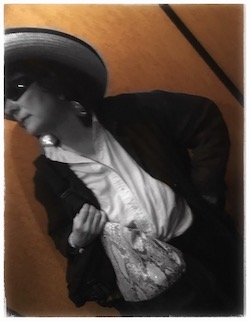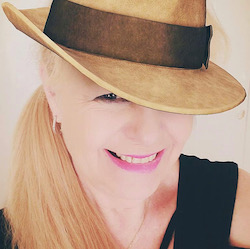Sex can be many things: loving, sad, embarrassing, horrific, routine, sublime. But it can also be funny. In her new chapbook Sex & Other Slapsticks, Ellaraine Lockie offers humorous, risqué poems. For example, she describes the speaker’s first encounter with a vibrator at age fifteen, “a muscle massage machine / that resembled a rock polisher.” She calls the vibrator “a courtier capable of betrayals” and “a fickle lover” who forces her to “eye” her husband’s electric toothbrush. Lockie deconstructs humanity’s sexual activities from an angle that’s honest, unpretentious, and hilarious, exposing the funny side of the mystery we call sex.
These gem-poems are entertaining, but they wouldn’t be so interesting if there weren’t also a serious element that’s never intrusive. “I go to great lengths to protect my loved ones” is the implicit message of the poem “The Robe Also Rises,” where the speaker’s dog runs away, and the speaker has to chase it down the street, wearing only a bathrobe and flip-flops. In “Treasures Today,” the speaker looks inside an antique jewelry box belonging to her fifteen-year-old daughter, only to find a vast assortment of packaged condoms—that’s a poem that could lead to some serious discussions.
Perhaps the highlight of the chapbook is “Role Reversal,” in which the speaker’s ten-year-old daughter gives the speaker, her mother, a list of things to do (and not do) when out in public with the daughter, including:
not to make
my zebra
bracelet talk
To wear a bra
Underpants too
Don’t do Tai chi
In the parking lot
while I wait
Personally, I would like to see the speaker perform all the activities on that list, especially the one about making the “zebra / bracelet talk.” Aren’t all children embarrassed by their parents at some point? It is Lockie’s gift to transform such embarrassments into poetry that is both funny and moving.
Lockie is a prolific writer: Sex & Other Slapsticks is her fourteenth published chapbook, and each poem in it has won a contest of some kind. The result is that this chapbook is composed of the crème de la crème of Lockie’s work. These poems are genuinely humorous, relatable, and beautifully written. But will reading them make you a better person? I bet they can.
First published in Rain Taxi Review of Books, Vol. 24, No.3, Fall 2019 (Issue #95).
***
Interview of Ellaraine Lockie: Humor, Sex, and Poetry
 Eileen Murphy (EM): Your poems are delightfully risqué and humorous. In them, you deconstruct the foibles of human sexuality. Please tell me what it’s like to become really good at writing funny poems about sex—over the years, has it changed you? What are some things you learned—about sex or otherwise—in the process of writing these poems?
Eileen Murphy (EM): Your poems are delightfully risqué and humorous. In them, you deconstruct the foibles of human sexuality. Please tell me what it’s like to become really good at writing funny poems about sex—over the years, has it changed you? What are some things you learned—about sex or otherwise—in the process of writing these poems?
Ellaraine Lockie (EL): Humor is one of the main tools I use to cope with life. We all have choices. I prefer laughter over tears, anger or negativity. Humor happens in even tragic situations if we are open to seeing it. It’s not that unusual for people to laugh at funerals, for instance. Laughter is therapy. I look for the comedic in any given situation and invite it in.
Sex is no exception. I think sex and humor are siblings belonging to the same family of healthy releases. Both promote wellbeing and serve to elevate us from stress. And the act of sex itself is really rather funny with its guttural sounds and wonky positions. Of course, humor has always had its off-color aspect for as long as jokes have been told.
Sharing the fun of humor through writing serves as a kind of drug for me. My first dose came when I was a senior in high school. My English teacher read to the class a comical essay I’d written about my cat who loved water. Everyone laughed, and the ability to evoke that kind of response was a thrill from which I never recovered. I’ve learned that I can have a tiny uplifting effect on readers’ lives, at least for a moment or two, and that reaction uplifts me as well.
EM: How did your childhood create or influence the writer that you are today?
EL: I come from a tiny Montana prairie farm town where people historically have had to come together in support of one another to survive. This kind of environment taught me the biggest lesson relating to my writing life: I learned that gossip didn’t really matter—that even when tongues wagged as entertainment, the entire community wrapped its arms around any of us at the slightest hint of need. I came away from this unafraid of what other people may say or think, that it’s inconsequential. Fearlessness is a tremendously liberating gift to a writer.
Perhaps just as instrumental to becoming a writer, especially that of humor, was my father’s influence. Back then when people got together socially, the women would sit in the kitchen or dining room, maybe play canasta and chatter about recipes, children, church doings and community events. Men would gather in the living room, talk about crops and tell stories. My dad was a master storyteller who would invariably start belly laughing himself while telling some tall tale. It was impossible for anyone in his audience to not laugh along with him.
I much preferred this company of men to the women’s group. I’d crawl behind a couch or whatever it took to listen. My dad was also a master exaggerator, and stories got bigger and bolder as he told them over the years . . . thus, my introduction to creative writing. Of course, they used frequent off-color words, unlike what was being discussed in the kitchen. (I was in college before I learned that a cocksucker wasn’t just another word for cockroach.)
My dad was also an avid reader—unusual for a Montana farmer at that time. When I was born, he bought a lifetime subscription to Readers Digest for me for $100, which was a lot of money in 1945. These examples of the importance of literature impacted me greatly. If I’m not in the middle of at least one book at all times, I feel incomplete, even edgy. I learned to write from reading good books probably more than from any class I took. I still receive Reader’s Digest regularly and go directly to each Issue’s humor sections.

EL: First, make sure the already-good poem is as excellent as it can be by running it through another poet or an agreeable editor. So often we see what we think we wrote instead of what is really there. I trade final editing of poems with a few special poet friends whose work I admire; and they often find at least one mistake or improvement.
When your poem is truly as flawless as you can make it, find the contests where it might compete well. By checking out the websites and reading issues or samples of poems a sponsor publishes, you’ll get an idea of what kind of poetry is valued there. You will be rewarded by wisely choosing which contests to enter, and you won’t as likely be wasting your time, money and energy.
Many contests list the judges’ names, so look up their work and decide which of your poems, if any, might have the best chances of winning. Go beyond the judges’ own work and read their bios. I’ve judged many contests and know well how judging becomes a matter of personal taste when the decision comes down to finalist poems that are all excellent but in different ways and with vastly different subjects. As contest entrants, we often have many choices between which of our poems to submit in any given contest. Why not choose the poems with subjects that might personally interest the judge?
EM: What’s your favorite poem written by somebody else and why?
EL: My all-time favorite poem, along with so many other people’s favorite I’m sure, is Mary Oliver’s “Wild Geese.” I actually keep a copy by my writing desk, and rereading it never fails to make me feel better when I’ve done or said something I regret. This poem helps to put everything into the perspective in which I want to view the world. I also love the poem for the way it so perfectly connects us to nature. Mary Oliver epitomized the power of poetry.
To buy the book Sex & Other Slapsticks by Ellaraine Lockie: http://presapress.com/books/sex-and-other-slapsticks
(Photos by Alexis Rhone Fancher)
